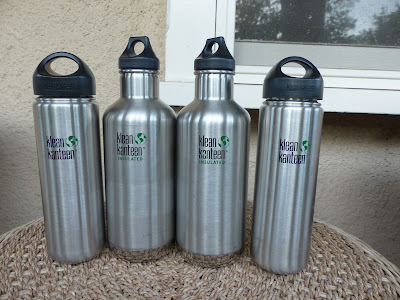Canny advertising promising to make our lives easier has resulted in many of us filling our homes full of stuff, most of which we don't really need. Few of these items are sustainably made, many cannot be repaired and when their useful life is over they are often not reusable or recyclable. Decluttering has become very popular - even our local council is running sessions for residents on how to tackle decluttering their homes.
One way to save help the world's finite resources is to put a stop to unnecessary stuff entering our homes in the first place. Before buying something, simply ask yourself "Do I really need it?" If we're being honest with ourselves then more often than not the answer will be no. If we question our purchases in this way we can end up reducing our consumption, reducing our environmental footprint and saving ourselves money at the same time. (The same question applies when we're faced with the prospect of free stuff - just because it's free doesn't mean we need it!)
The next step when thinking about buying something is to consider the lifecycle of the product in question. Plastic is not kind to the environment or to our health. Recyclable plastic items are generally down-cycled into other lower grade plastic products which eventually end up in landfill. And those items keep on keeping on - lasting well past our lifetimes. Just because we've thrown something away, doesn't mean it has disappeared.
With just a little bit of thought it's easy to make the move away from plastic versions of many everyday items to ones made out of more sustainable materials. Simply tossing everything out and buying all new stuff isn't the most sustainable approach so we're replacing things on an 'as needs' basis. When something wears out, if we plan to replace it we look for a more sustainable option. Fortunately there are a lot of great businesses out there who want to provide people like us with more sustainable alternatives. Listed below are some of the ways we've reduced plastic in our home. The items mentioned below are examples of what's available - we're simply sharing what we're using around the house.
Wooden dish washing brush with replaceable head. An easy swap away from plastic was to switch to a wooden dish washing brush. We chose a version for which you can buy replacement heads. It's made from untreated beechwood with natural bristles.
This was not an expensive change - the brush was $5.95 and replacement heads are $3-$4 each. I found ours at local supplier Scout House but the same product is also widely available online.
 |
| Redecker Dishwashing brush |
Biodegradable bamboo toothbrushes. There are a lot of alternatives to the ubiquitous plastic toothbrush. We found a local supplier Got Wood, who sell toothbrushes made from sustainably grown bamboo with bamboo fibre bristles. At $5.60 including postage they won't break the bank.
 |
| Got Wood TB |
When the toothbrush is no longer suitable for the job it is completely biodegradable and safe to burn in our wood heater.
Wooden nail brush. As we do a lot of gardening and outside work, a sturdy nailbrush is a must for us. We swapped from a plastic one to this wooden one, purchased locally for $22:
 |
| Gardener's nailbrush |
Wooden brush and stainless steel dustpan. Our dust pan and brush see a fair bit of active duty. We have a brush made from beechwood and horse hair and a stainless steel dust pan - both purchased locally.
 |
| Redecker shovel and sweep |
It's worth noting that wooden brushware does require a bit more care than plastic. Keeping the wooden part out of water when not in use and allowing the brush to dry in sunlight will extend the life of these items. Applying a mixture of beeswax and coconut oil to the wood will help preserve it too.
Stainless steel water bottles. Reusable water bottles are a no-brainer. These days plastic water bottles are generally BPA-free, however they still contain other chemicals that are worth avoiding. We use stainless steel water bottles instead, and while the initial investment seemed a bit pricey (ours come with a lifetime warranty), we were happy to make the swap. We each have an insulated and a non-insulated bottle, which is enough to satisfy a thirsty day's work planting trees at our country block. As well as keeping drinks cold, the insulated versions are great for soup and hot drinks. Being stainless means they don't absorb odours or flavours.
There's nothing mind-blowing in the list above but choosing these items over their plastic versions does the environment and our health a favour and supports those businesses trying to make a difference. In our opinion these items are of higher quality and are far more attractive than their plastic counterparts. They also feel nicer to use.
If enough people swapped to using items like these when their current versions bit the dust then one day, who knows, plastic dish washing brushes may end up being the exception, rather than the norm. Now wouldn't that be nice?
Any tips you have for sustainable options around the home?


No comments:
Post a Comment